Erstellt am: 21. 11. 2012 - 12:40 Uhr
Ugandan Diary Part 4: Obama the Rhino
- Read all entries of Chris Cummin's Ugandan diary
The crushed cab of the truck lay upside down on the tarmac. The windscreen had been smashed away and the roof compressed down almost to the height of the steering wheel.
The truck`s load, some sort of grain, had been spilled over the roadside and a team, working under the hot sun, were shoveling it up and refilling it in to white gunny sacks.
They waved cheerfully as we passed, encouraging us up the hill on which the wreck had come to a halt, but this was a macabre scene. I looked again at the compressed, burned-out cab and couldn`t imagine the driver had survived such a crash. Another roadside tragedy in Africa, another family breadwinner lost.
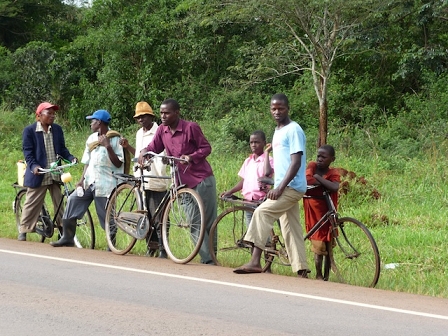
chris cummins
Around 2,000 people are killed each year on Uganda`s roads. The World Health Organisation projects that by 2020 health losses from traffic accidents will rank only second to those of HIV/AIDS.
I cycled on, feeling a chill under the hot sun.
Sacks of Charcoal
On this road it was speed rather than potholes that posed a threat to drivers. It was relentlessly straight and incredibly smooth - an invitation to put your foot down and, perhaps, fatally, to lose concentration.
We had over a hundred kilometres to cover but in these conditions we made rapid progress, passing clusters of round, thatched mud huts. Goods were laid out at the side of the road in tall white sacks that had been fortified with straw. Many of them were filled with charcoal, which still provides an inefficient and polluting smoky fuel for Ugandan homes.
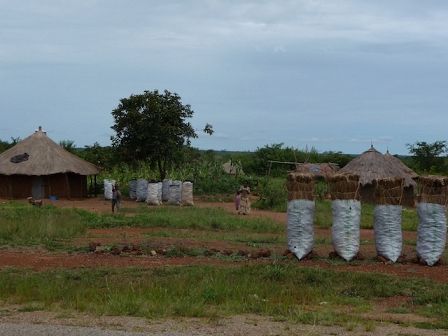
chris cummins
It was fairly soul-sapping cycling, We were always either climbing or descending and at the top of each hill we saw for miles ahead, the road cut a silver line over a seemingly endless succession of waves.
A Slow Recovery
The next major town was Gulu. As I mentioned yesterday, it`s a place that at the beginning of the 21st century had suffered terribly at the hands of Joseph Kony`s murderous Lords Resistance Army. The LRA have been pushed out of Uganda, and Gulu and other parts of the north are making a gradual recovery.
Foreign aid and national funds are being pumped into the local infrastructure to speed the healing process. The impressive road, which Patrick, our Ugandan guide, said had been built with World Bank money, would surely help.
The road was still fairly empty, though, although we were often overtaken by buses headed to Juba for the new state of South Sudan. They had an arduous journey ahead.
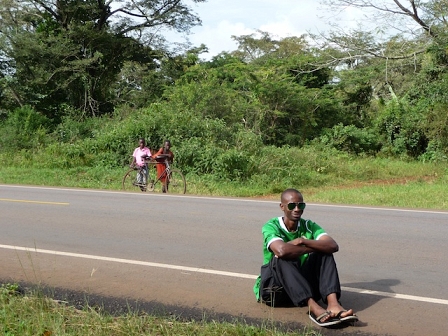
chris cummins
In the late afternoon, as cloud storms were gathering, we headed left down a dirt track to the Ziwa Rhino Sanctuary, our stop for the night. If we hurried there was a chance to go and see the rhino before sundown. They had once flourished across Uganda but were so mercilessly hunted and poached in the 20th century that by the mid-1980`s, after a gun-flooded period of lawlessness and poor governance, they had been totally wiped out.
The Return of the Rhino
The 7,000 hectare sanctuary, which was established in 2005, is a breeding ground. Rhino are brought from Kenya and even, believe it or not, from Disney Animal Kingdom in Florida. They are kept in the park by a solar-powered electric fence around the perimeter of the sanctuary. Gradually the rhinos are being reintroduced into Uganda`s national parks. I was excited to see them.
I`d have to wait - our appointment was rained off.
On the final 9km inside the park, we cycled straight into the heaviest tropical downpour I`ve ever experienced. The water came down in sheets, it was a struggle just to see, and the water was running in streams down the dirt track, eroding it from under our wheels. Drenched and filthy, we sprinted into the guesthouse at the sanctuary only to find both the showers and the electricity were broken. I put on my swimming shorts, showered in the rain and headed to the bar to drown my sorrows.
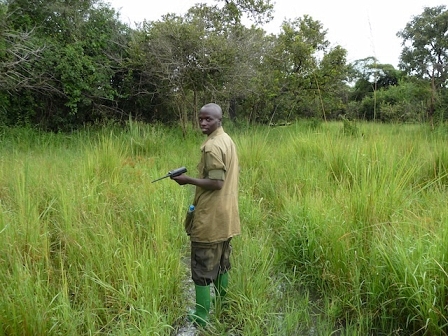
chris cummins
But early the next morning, slightly hung-over, I found myself tramping in rubber boots in the marshy ground behind park ranger Opeo to find the rhino. There are twelfe of them in the park right now, he explained, six adults and six young ones. Half of the rhino will be moved into various national parks, and the other half will remain in Ziwa for further breeding. The last one of the rhino donated by the Disney Animal Kingdom gave birth to a calf. His father was one of the bulls from Kenya:
"So naturally we had to call him Obama!" said Opeo with a grin.
It was easy to find them. Such is the fear of poachers that wardens track the rhino 24 hours a day, alternating 12-hour shifts. Opeo just had to call the poor guards who were coming to the end of the night shift by walkie-talkie and then we splashed off in the their direction.
Rhinos, which munch away on grass, like to be near water and this swampland, which was overgrown with tall, richly green grass and alive with the sound of insects and croaking frogs, must have their idea of paradise, but, especially after the heavy rain, it was tough going for me in my rubber boots. But then, when we emerged from behind a curtain of thorny acacia trees there they were: a mother and a calf, nibbling on the grass, sipping from the puddles.
They mostly kept their heads down but occasionally, they`d raise their heads, sniffing up in their air and showing off iconic sabre-tooth shaped horns. They were magnificent. Nothing can prepare you for that sight.
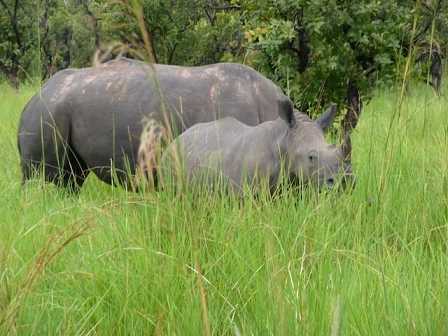
chris cummins
These were White Rhino, although even with my eyesight I could tell they were clearly a dark grey colour. The misnomer is down to a common phenomenon: the Englishman`s ignorance of foreign languages. The Dutch-speaking Afrikaans of South Africa were the first white men to see a rhino and they dubbed them "weit" because of their wide upper lips which their use to pluck the grass.
Slaughtered For Health Myths
These beautiful animals, almost pre-historic looking, are still poached - according the group Save The Rhino , 488 have been killed in South Africa so far this year. Often they are killed to fuel the Chinese medicine market, where the ground up powder from their horns is highly prized.
Save The Rhino write that demand has been rising recently due to "unfounded rumours that rhino horn can cure cancer". The ground powder is sold as a powerful a detox remedy after heavy eating and drinking and, surprise, surprise, as a potency aid.
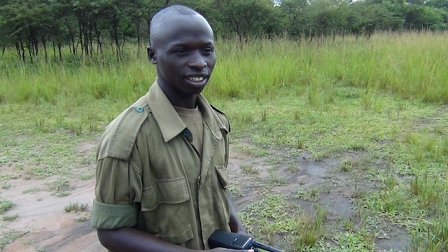
chris cummins
We splashed off again because Opeo wanted to show me a bull. Large white butterflies fluttered by as I struggled to make sure the water did not tip over the brim of my rubber boots. It was a beautiful early morning hike - between the acacias, there were green trees called euphorbia candelabrum because their cactus-like branches looked like a huddle of candles.
An Encounter With Big Daddy
Then Opeo raised a finger to his lips and we peered around a bush to see where the bull, called Talo, was grazing. He was huge. It was like seeing a grey mountain slowly moving through the grassland.
And he was impressively virile: Talo fathered all six of the baby rhino born at Ziwa. But he also had a reputation for being fierce, especially during the mating season, which I was alarmed to find out, was exactly now.
"What do I do if he charges?" I asked Opeo.
"You should climb a tree or hide behind a bush where he can`t see you."
I looked around at the acacia trees. I couldn`t imagine myself hauling myself up one of those in a panic:
"But I am no good at climbing trees!"
"Well then it is better that you hide in a bush!"
Thanks to Talo`s benevolent mood, the ride continues on tomorrow to Masindi, where Hemingway recuperated between his two African plane crashes. I`ll meet the local director of education and visit a rural school to see how Link Community Development`s school improvement projects are being implemented and to see if they are working. I hope you join me.


